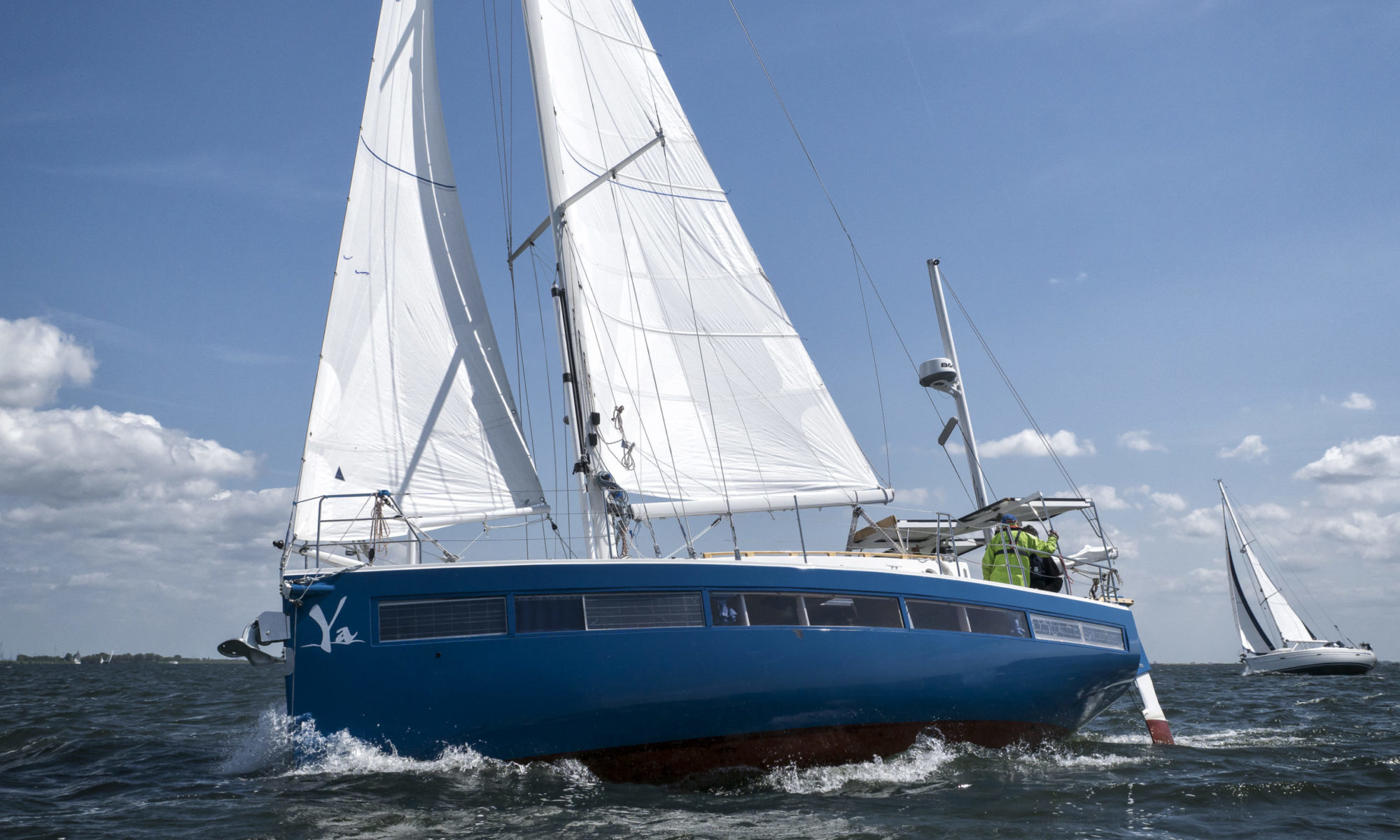A dock with some kayaks and SUP-boards, a leaf covered hut with a small cocktail bar, and from there a path meandering uphill a garden, between trees, flowers and plants, a yellow hermit crawling away, it is like walking through the Garden of Eden. We end up at a two-store mansion with a nicely decorated porch. There we meet Brian and his partner Amy. They run Dolphin Bay Hideaway, and even in the low season they continuously have guests. Brian gives us coffee at the big wooden table, with the view at the plants and flowers, butterflies, hummingbirds, a black-and-green spotted frog, and at the very end a view to the bay. You feel all over that the Hideway hotel is run sustainably and makes the next generation happy.
But that is just part of their secret.
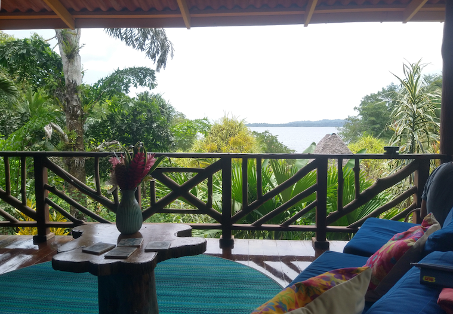
Sustainable business
As fossil fuel free sailors, we first ask how they generate their energy. Like we saw on Solarte, also the island San Cristobal doesn’t have electricity. Brian says: “The choice for solar is obvious for us, although the investment is big.”
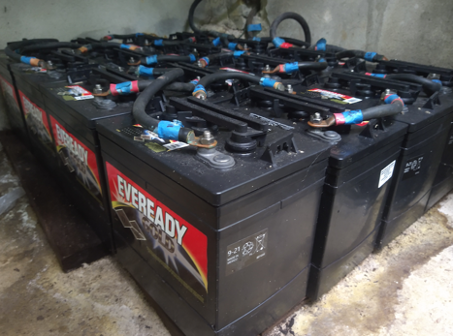
But they can supply mainly on solar power, because the hotel makes the guest use only what they need. Do the guests need airco? No, that would keep them inside, instead of closer to nature. So, they use ventilators to keep the pleasant atmosphere, in the rooms and on the porch, the gym or where ever.
Also, they see a growing number of vegetarians under the European teenagers. Eating too much meat is also an issue in climate change. So, their kitchen has adjusted to that, serving many attractive vegetarian dishes, and using local ingredients.
The hotel is also self-sufficient on water. The rain water from the roof is caught into big tanks. So, we ask if the hotel has enough in storage to buffer the drier seasons. We tell him that a Dutch household takes 130 liters per person per day. Brian answers: “Well, the average water consumption of an American USA citizen is a staggering 320 liters per person per day.” OK, now there is no lawn to spray or a car to wash, but still, they consume a lot.”
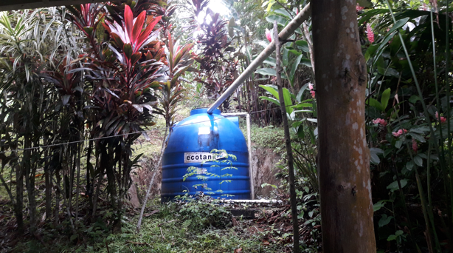
Brian continues: “I always monitor the water usage, and I need to. When American teenagers come to the hotel, wechallenge them to limit the number of showers required each day. At first this is an effort for them, but with some explanation, they are motivated to adjust their behavior, and quickly get used to it. Then they celebrate their vacation with the same joy.”
There are few and unenforced local laws regarding sewage systems, but on the hotel they use septic systems. When the tank is full, its contents are brought to a little land to fertilize the soil. It is now named ‘poopy field’ and everything grows super! This is the perfect solution for a scarcely populated area; the land benefits and no black water is flushed into the valued Dolphin Bay.
Nature business
Brian and Amy’s driving force to start this hotel, is in one word: nature. You recognize their love immediately in everything. The beauty of the garden, and in all details everywhere in the hotel. The way it is built, from the wooden floors, the furniture, the flowers in the vases on the porch, the little signs with the plant names in the garden.
We talked with some guests. They don’t care to spend some extra time and money to go off the beaten track, so to be sure to spend their precious vacation time in a nature environment.
Click here to get an impression of the plants in the garden.
Sustainable nature
The hotel is small, but the business runs well. But Brian and Amy also see their environment, the surroundings of the hotel, and that is challenging.
Brian explains: “Deforestation is a big and growing problem in Panama. The jungle forest is cut out to make way for cattle grazing, other agriculture or land development. For sure it is good if here and there a patch is cleared to keep some cattle, but that was in the past. Now the scale gets bigger. Many of the trees, with huge natural diversity, have a good value on the lumber market, for wood or charcoal. So, they are cut down. Now, on some islands, only five to ten species remain.”
Deforestation is a global environmental issue. But here it is also a nature issue. Many of these trees cut out, are typical for Panamas’ jungle. It is the diversity of nature involved here, the wealth of our earth.
“So, what we do with the acres we have, is reforesting it bit by bit. We plant that mix of species to restore the original forest. “
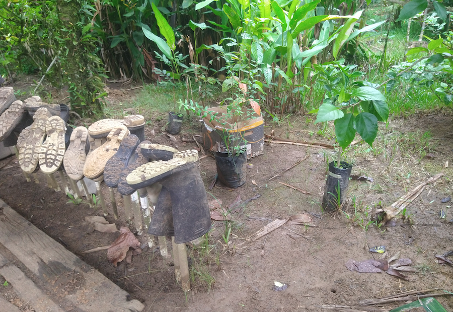
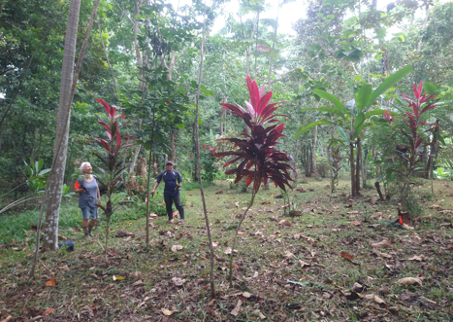
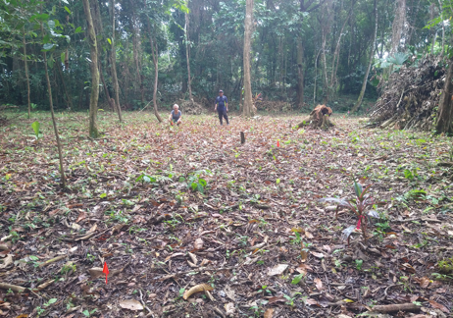
All this leads to a subtle but clear interaction. Many hotel guests see this work. They like it. They plant a tree. The Dolphin Bay Hideaway hotel is not only an ‘eco lodge’, but the guests also see that a part of their money goes into building nature again. This is no ‘green talk’, Brian plans to plant 1000 trees each year. So the reforestation is a continuous part of the business.
The Dolphin Bay Hideaway hotel is an example of how to run your top-notch hotel business sustainably, and to keep mother Earth in shape, in all her wealth, for our next generations.
